Women’s cricket records expanded
Following the adoption by the ACS last year of a definitive list of women’s first-class matches, we have arranged with Cricket Archive for an extensive range of women’s first-class records deriving from these matches to be posted on our Online Records site, along with similar lists covering the full range of women’s List A and women’s T20 cricket.
The ACS list of women’s first-class matches, prepared over many years by Peter Griffiths and Philip Bailey, currently includes 1,583 matches in 12 countries, going back to New South Wales v Victoria in the Australian Women’s Cricket Championships in February 1934.
Full scores of many of these matches have yet to be traced – especially for Australia, New Zealand, India, South Africa and the West Indies. To fill the gaps, we are seeking help from members and statisticians with access to possible sources. If you could help, please email contact@acsccricket.com.
ACS Auction No. 20 – 14-23 February
Our next auction of cricket publications began at 8am GMT on Saturday 14 February and closes at 10pm GMT on Monday 23 February.
Normally we attempt to offer material which is in good or excellent condition. In this auction we are offering a number of historic publications (e.g. James Lillywhite’s Cricketers’ Annuals) whose condition is in some cases compromised by significant defects, which are clearly spelled out in the catalogue; nevertheless, we believe some members may be interested in acquiring them. For further details, please direct your questions to auction_admin@acscricket.com.
So far, our auction offers have been limited to cricket material. We are aware that many ACS members follow other sports, so we are also offering 21 lots relating to Rugby Union. If this proves popular, we may extend this approach to include other sports.
In addition to the above, the current auction catalogue includes:
- ACS Match Scores up to 1900
- many copies of Scores and Biographies
- a large range of Wisdens, 1952 to 1997
- copies of The Journal of The Cricket Society, up to 1979
- a range of Cricket Society Year Books to 1970
- a range of Minor Counties Annuals and Handbooks, 1977 to 1995
- a range of Second Eleven Annuals, 1985 to 2005
Members need to register in advance: the terms & conditions, the registration process and the catalogue of items can be viewed here.
If you have any questions or other issues about the auction, these should be sent to auction_admin@acscricket.com
Note for overseas bidders:
During past auctions we have experienced issues with deliveries to some overseas destinations, especially south Asia and Canada. If overseas bidders can nominate a UK postal address, they will not only guarantee safe and swift delivery of their consignments, but will also save on postage costs. For those who cannot, we suggest requesting a more secure form of postage (including insurance and tracking) or a courier delivery to minimise the risk and cost of loss in transit. The ACS is not in a position to guarantee delivery and the auction rules clearly state that the delivery risk resides with the bidder.
What is the ACS?
Who is the oldest man to hit a Test match century? What is the most expensive bowling analysis in first-class cricket? Does a match start with the toss, the call of ‘Play’ or the first delivery?
If you are intrigued by such conundrums, or if you’re interested in the origins and history of the game, you’ll find a group of like minds in the ACS. Founded in 1973, we are an international body represented in over 20 countries, and our members include most of the world’s leading cricket statisticians and several of its most accomplished historians and biographers.
Our principal purpose is ‘to promote and encourage research into the statistical and historical aspects of cricket throughout the world at all levels and to publish the findings’. Members of the ACS have significantly contributed to a wider understanding of the game and have led the way in uncovering many biographical details of first-class cricketers.
We have around 800 members all over the world. Membership is open to everyone – all you need to join us is to share our interest in the statistics and history of the game. The ACS aims to appeal to people with an interest in every form of the game. Read why TMS statistician Andy Zaltzman thinks you should join in An invitation to join the Association of Cricket Statisticians and Historians (PDF).
Although in the past, much of its work has focused on men’s first-class cricket, more recently it has published material on women’s cricket and taken the lead, for example, on developing statistics for the new Hundred competition.
To encourage research work on a broad range of topics which are likely to appeal to as wide an audience as possible, the ACS will:
- continue to invite contributions to its activities from all its members;
- actively encourage new projects related to forms of cricket which have received less attention in the past (including recreational cricket, women’s cricket, disabled cricket etc);
- seek to take the lead in the collection of statistics for these and other under-researched aspects of the game;
- selectively offer financial support to worthwhile projects which are aligned with the ACS’s objectives; and
- make regular use of different social media platforms to engage with a more diverse audience.
Members receive our quarterly journal, The Cricket Statistician, and an annual voucher, currently worth £8, towards the cost of our printed publications. They are entitled to a 33% discount on subscriptions to the Cricket Archive website and to the CSW cricket database. Members can also join our email forum to share information, ask questions and chat about topical cricketing issues. Details about the email forum and discounts are available in the Members Area; any member who does not have the password for this page should contact webmaster@acscricket.com.
We publish a range of titles which are available in the ACS Online Shop.
The website includes several valuable research tools open to all visitors:
- The digitised version of Cricket: A Weekly Record of the Game, the magazine which ran from 1882 to 1914.
- The ACS Online Cricket Records Section, which is updated on a daily basis and covers first-class cricket, Test cricket, List A, Twenty20 and women’s international cricket, with some minor cricket records too.
- The archive of The Cricket Statistician up to 2022 in digitised form; copies of more recent issues are still on sale in the shop.
- Our Research Section which contains further resources, including the first two parts of a massive A to Z of Kent Cricketers, compiled by Derek Carlaw and covering all Kent players who appeared between 1806 and 1999, plus County Cricket: Sundry Extras, biographical details compiled by David Jeater on over a thousand county cricketers with achievements in areas of public life away from cricket.
- Our Collaborative Research Projects – if you’d like to get involved in our research, there’s a list in the Research Section of collaborative projects we have set up since March 2020 on topics such as women’s cricket, league cricket, national competitions, county committees, scorebooks, cricketers who died in war, and more; do get in touch if you’d like to join in (contact details on the Collaborative Research Projects page).
- Our answers to a number of Frequently Asked Questions about the statistics and history of cricket
- Ask the ACS, a collection of statistical questions and answers on specialised one-off matters.
- Guidance from the ACS Statistics Logistics sub-group on the recording or calculation of cricket statistics.
You can also follow the Association via Twitter, at @ACScricket; on Instagram, at acscricket; on Facebook, at Association of Cricket Statisticians & Historians; on YouTube, at ACScricket; on Mastodon, at @ACScricket@mstdn.social; on Bluesky at @ACScricket.bsky.social; and on Substack at acscricket.substack.com (more details here).
You can watch a video interview with founder Robert Brooke on the ACS YouTube channel, and read more about the formation and earlier years of the ACS, and about the individuals whose hugely-valued efforts set us on our current path, in Twenty-One Years of the ACS, by our late President, Richard Streeton.
If you are looking for an answer to any question about cricket, seeking clarification about a particular record or feat, or searching for information on a team or a particular player, please send an email to secretary@acscricket.com and the Secretary will point you in the right direction.
TT/ACS Search Engine
The ACS committee has entered into a collaborative arrangement with Triwizard Technologies (TT), based in India, to create a search engine for ACS members that accesses TT’s database to provide analysis of international cricket, both men’s and women’s. This is very much a work in progress, and will gradually be expanded over time to include analysis of first-class, List A and List A T20 cricket for both genders. It is also anticipated that the range of searches will be expanded.
Access for the first six months will be free, after which a nominal annual fee will be charged, to enable the Association to recoup, over time, the significant investment it has made to advance this project.
This facility can now be accessed by clicking on the Search Engine in the side bar, or the Search tab in the new navigation in the archive section of the ACS website.
It is password-protected, so you will be asked to register. Members are encouraged to send comments to dbsearch@acscricket.com.
AGM 2026
The 53rd AGM of the ACS will held via Zoom on Saturday 21 March 2026; members will be sent details nearer the time.
The Minutes of the 2025 AGM, plus a recording (lasting 53 minutes), are available in the password-protected Members Area.
Andrew Hignell – thank you
Andrew Hignell, the Association’s long-serving Honorary Secretary, will formally step down at the AGM because of ill health. As an interim measure, committee member Jeremy Lonsdale is covering the function of Honorary Secretary, including responding to emails sent to secretary@acscricket.com. Following the AGM, the Committee will appoint a new Secretary, in line with the Association’s Rules, to fill the remainder of the Honorary Secretary’s term, which ends in 2027.
The Committee would like to thank Andrew for his excellent service over many years. We very much hope that his health continues to improve and will enable him to play other roles in the Association in the years to come.
Latest publications
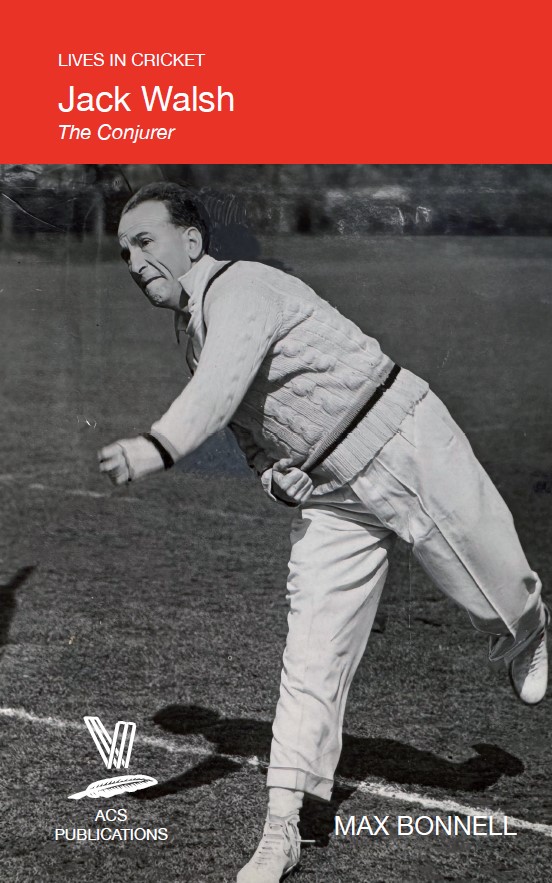
Our latest publication is Max Bonnell’s biography of Jack Walsh: The Conjurer. A late starter, Walsh was 27 when he first played for New South Wales, and 33 when he signed his first professional contract with Leicestershire; wartime then robbed him of six prime years. Yet he still captured 1,190 first-class wickets and won a reputation as one of the most entertaining players in the county game, whether he was puzzling opposing batsmen, holding spectacular catches at slip, or swinging the bat with carefree delight.
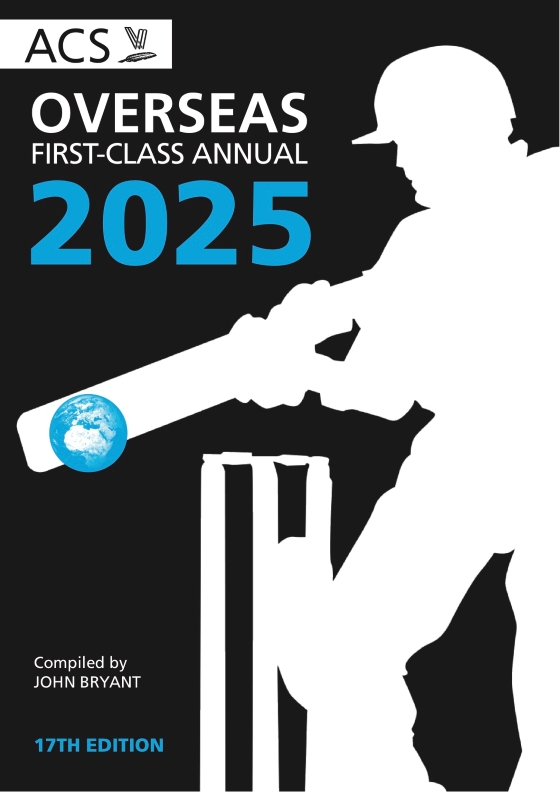
The 17th edition of the ACS Overseas First-Class Annual includes full scorecards for the 555 first-class matches played during the 2024/25 season, as well as eight played outside England and Wales in 2024, plus league tables for first-class domestic competitions and comprehensive match notes.
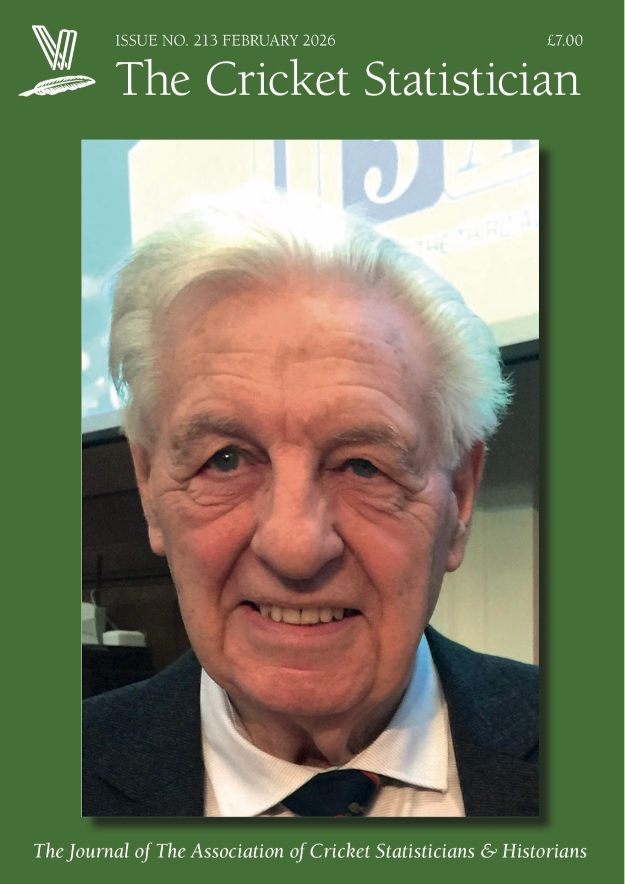
The February issue of our quarterly journal The Cricket Statistician is the first edited by Russ Houldin. It commemorates our late President, Eric Midwinter, and also contains statistical analyses of Virat Kohli’s Test career, extracts from an 18th-century aristocratic family’s letters illustrating their interest in cricket, and four scorecards of matches played in the West Indies between 1867/68 and 1906/07 which have now been added to the first-class list.
The previous issue paid tribute to Robert Brooke, who co-founded the Association in 1973, and also featured Simon Wilde on the legacy of Gilbert Jessop’s famously fast (but how fast?) Test hundred, and David Frith’s reflections on his career as a cricket magazine editor.
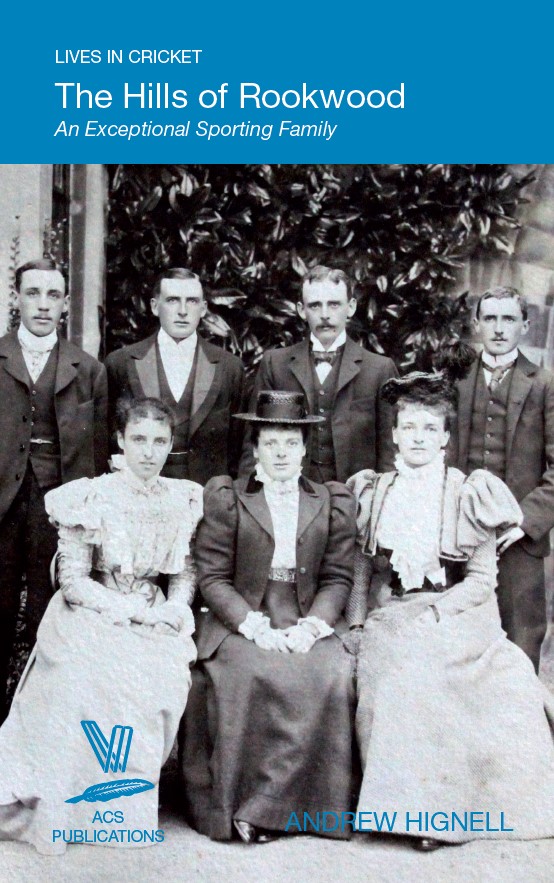
In The Hills of Rookwood: An Exceptional Sporting Family, Andrew Hignell tells the story of Sir Edward Stock Hill, a prominent 19th-century businessman, and his family, during a pivotal period in cricket’s evolution in South Wales, either side of the First World War. Hill’s sons and grandsons played county and representative cricket, while his daughters were pioneers in the women’s game.
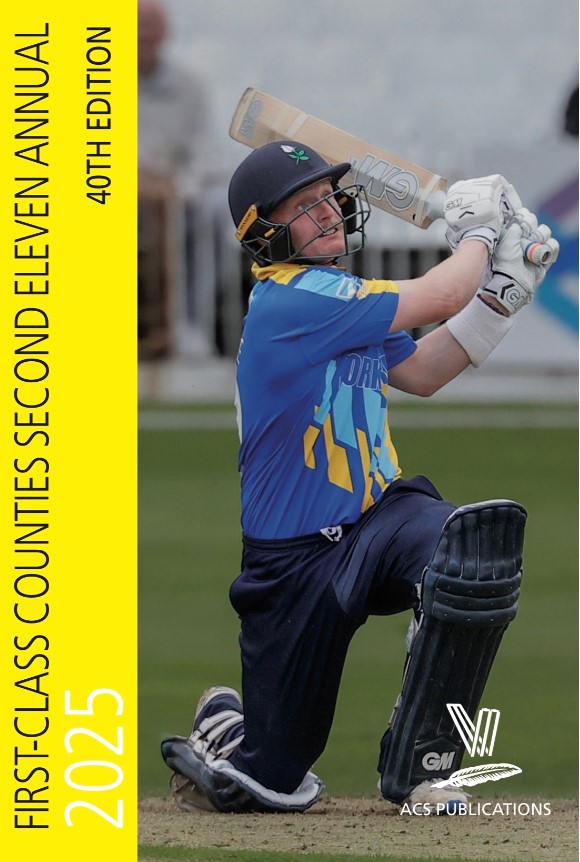
The 40th edition of our Second Eleven Annual 2025 provides details of performances in the 2024 Second Eleven Championship (won by Nottinghamshire) and Twenty20 competition (won by Somerset), along with a Who’s Who of cricketers who played in those tournaments, and updated Second Eleven records. It also includes details of the South Asian Cricket Academy.
Other recent publications include Brick by Brick, in which Max Bonnell explores the Australian tour of 1964, when a derided touring team won the Ashes as 13 years of Conservative government were ended by an election presented as a choice between revitalisation and the class-ridden shackles of the past; and The Dream That Died: Gwilym Rowland and Welsh Cricket, Andrew Hignell’s account of Gwilym Evans Rowland, a businessman who tried to raise Welsh cricket’s profile through a team which played home internationals against Scotland and Ireland and appeared at Lord’s, but who ended penniless, his body found in a ditch.
All books published in the last year which remain in stock appear under Latest Publications. Many earlier publications are available in the online shop, including extra copies of the ACS Journal, The Cricket Statistician.
If you need to get in touch with ACS Sales, their contact details are here.
More ACS news
A summary of recent website updates
Join the ACS
If you are not yet a member of the Association, we very much hope that you will consider joining. Click on Join the ACS and follow the links and instructions there.
There is an option of digital membership, for those who prefer to receive the quarterly mailing in electronic form.
Once you have joined, you will have access to the Members Area and can subscribe to the Members’ Email Forum. Members can obtain the password for the Members Area by sending an email to webmaster@acscricket.com.
